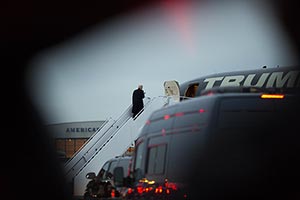Trump's Trade Team Suggests His Hardnosed Campaign Talk Was No Bluff

The makeup of President-elect Donald Trump’s trade team suggests he wasn’t joking when he promised voters to shake things up.
On the campaign trail, Trump portrayed an America that has been shortchanged by bad trade deals and unscrupulous trading partners, leading to the hollowing out of the nation’s manufacturing sector. He promised to label China a currency manipulator and renegotiate the North American Free Trade Agreement with Canada and Mexico.
Since the election, Trump has taken aim at individual companies, warning General Motors Co. this week that it could face a "big border tax" if it doesn’t shift production to the United States from Mexico. And the track records of his top trade officials signal that his administration will take aggressive steps to boost exports, according to trade experts.
"It’s clear this wasn’t just campaign rhetoric. The team that the president-elect has put in place was at the core of advising him during the campaign and has a clear playbook of what it wants to implement," said Mark Wu, an assistant professor at Harvard Law School who worked in the office of the U.S. trade representative under George W. Bush. "They’ve been pretty straightforward about their view of the status quo, which is that it undermines American economic interests."
Chinese state media has already criticized all three key players in Trump's trade team as supporters of rolling back globalization, warning the incoming administration about the risks of sparking a trade war.
Robert Lighthizer, Appointee For U.S. Trade Representative
Trump this week nominated Lighthizer as his chief trade negotiator. Lighthizer, 69, was deputy trade representative under Ronald Reagan and is now a partner in the Washington offices of law firm Skadden, Arps, Slate, Meagher & Flom LLP. He has extensive experience representing the U.S. steel industry, which has frequently accused China of dumping cheap products in world markets. In a 2011 article published in the Washington Times, Lighthizer said that using tariffs to promote American industry was a Republican tenet harking back to the party's roots. "How does allowing China to constantly rig trade in its favor advance the core conservative goal of making markets more efficient?" he wrote. He'll face Senate confirmation.
Wilbur Ross, Commerce Secretary Nominee
Ross, 79, is a veteran private-equity investor who has served on the board of companies ranging from Luxembourg-based steel giant ArcelorMittal to the Bank of Ireland. He also happens to be an avid collector of Chinese art, according to a recent profile in Politico Magazine. Before the election, Ross decried what he perceived to be a penchant toward China bashing in the United States. But during the campaign, he co-authored an unflattering report that described the world as "riddled with trade cheaters," with China the biggest culprit. The Senate must approve his appointment.
Peter Navarro, Head of White House National Trade Council
Ross’s co-author on that report was Navarro, an economics professor at University of California at Irvine who has been a vocal critic of China’s trade practices. As the head of a newly formed trade council inside the White House, Navarro will be an influential voice on everything from how the U.S. deals with China to the way it taxes its corporations. Navarro, 67, has blamed Nafta and China’s 2001 entry into the WTO for hobbling the U.S. economy. He directed a documentary called "Death By China: One Lost Job At A Time'' based on a book he co-authored.
"They see trade as a zero-sum game," said Daniel Ikenson, director of trade policy studies at the Cato Institute, a free-market think tank in Washington. "It’s Team America against the foreign team, with exports as Team America’s points and imports as the foreign team’s points."




